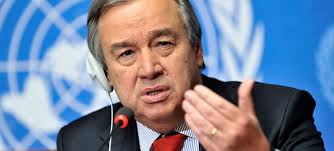The coronavirus pandemic could push 100 million people into extreme poverty worldwide, UN Secretary-General Antonio Guterres warned over the weekend.
Guterres said this as the world celebrated 18 July as the International Mandela Day on Saturday to mark the 102nd birthday anniversary of the late South African President Nelson Mandela who died in December 2013 at the age of 95 after a long illness.
Paying tribute to South Africa’s first black president, Guterres said Covid-19 was “shining a spotlight” on global injustice and has revealed the “fragile skeleton of our societies.”
“We have been brought to our knees by a microscopic virus. The pandemic has demonstrated the fragility of our world,” the UN boss said at a virtual memorial lecture organised by the local Nelson Mandela Foundation to observe the occasion.
He added: “Entire regions that were making progress on eradicating poverty and narrowing inequality, have now been set back years in a matter of months” due to the virus.
According to Guterres, the economic fallout of the pandemic, which has infected more than 14 million and killed close to 600,000 people worldwide, was being disproportionately felt among informal workers, small businesses and women everywhere.
Due to the pandemic, “we face the deepest global recession since World War II. One hundred million more people could be pushed into extreme poverty.
“We could see a worldwide famine of historic proportions,” the UN Secretary General said.
NM/as/APA


